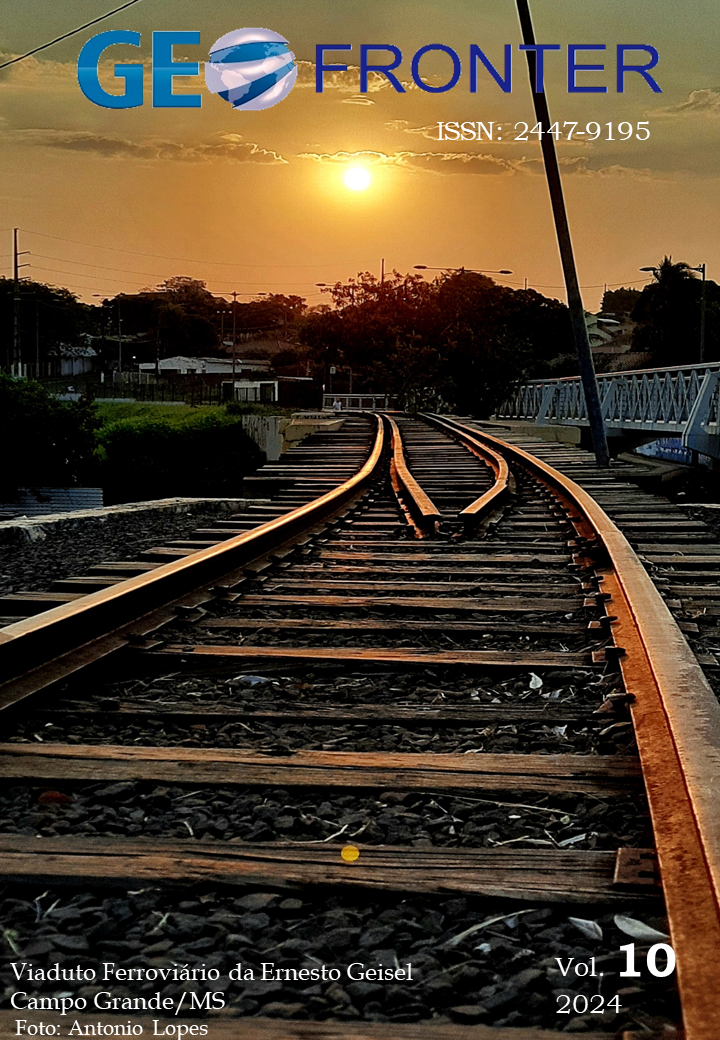GEOGRAFIA DE LUGAR NENHUM
uma breve análise do processo de hiperglobalização em Três Lagoas – MS
DOI:
https://doi.org/10.61389/geofronter.v10.8380Keywords:
Geografia de lugar nenhum, Três Lagoas, Hiperglobalização, Lugar, Não-lugarAbstract
This study was carried out with the support of the Federal University of Mato Grosso do Sul – UFMS/MEC – Brazil. Globalization produces inevitable changes in the logic of spaces, landscapes, and the social organization of individuals. In recent decades, changes in the spaces occupied by humans have intensified, reaching the most distant areas of the planet, producing a phenomenon called the Geography of Nowhere or hyperglobalization, presented by the geographer George Benko (1998), where these places, based on the globalizing capitalist logic, are presented in socio-spatial production following similar technical, architectural, and organizational patterns anywhere in the world, imposing the standardization of values and habits on the most varied identities and cultures.The approach of this study will be qualitative, having as data collection procedures documentary research through articles, narratives, and general productions on the internet, producing content analysis and association, with the objective of investigating the aspects and characteristics of the production of the urban space of Três Lagoas. The Geography of Nowhere in Três Lagoas reveals the impacts of hyperglobalization, producing standardized spaces, resulting in the loss of local identity. It is essential to rethink the relationship between globalization and cultural preservation, in order to promote sustainable development, preserving the essence of the places that configure the urban space of Três Lagoas.
Keywords: Geography of Nowhere; Três Lagoas; Hyperglobalization; Place; Non-place.
References
BENKO, Georges, Geografia de lugar nenhum ou hiperglobalização: breve exame do mundo pós-moderno. In: SANTOS, Milton; SOUZA, Maria Adelia A. de; SILVEIRA, Maria Laura (Orgs.). Território: Globalização e Fragmentação, São Paulo : Hucitec, 1998. Disponível em: <https://encr.pw/rvmSK>. Acesso em: 17/04/2023.
CLAVAL, Paul. O território na transição da pós-modernidade. Geographia, Niterói, UFF, ano 1, n.2, 1999. Disponível em: <https://l1nq.com/D2ccB>. Acesso em: 18/04/2023. DOI: https://doi.org/10.22409/GEOgraphia1999.12.a13349
FIUZA, Isabela Cançado. Os efeitos da globalização no comércio: o caso da Rua de Santa Catarina, Porto. Dissertação (Mestrado em Planejamento e Projeto Urbano) – Faculdade de Engenharia, Universidade do Porto. Porto - Portugal, p. 01 - 261. 2020. Disponível em: <https://l1nq.com/EpUZV>. Acesso em 02/05/2023.
HARVEY, David. Condição Pós-moderna: Uma pesquisa sobre as origens da mudança cultural. SP: Loyola, 1989. Disponível em: <https://l1nq.com/LQrE3>. Acesso em: 17/04/2023.
IBGE – INSTITUTO BRASILEIRO DE GEOGRAFIA E ESTATÍSTICA. Censo Brasileiro de 2023. Rio de Janeiro: IBGE, 2021. Disponível em: <https://l1nk.dev/nKpHD>. Acesso em: 11/05/2023.
SANTOS, Milton. A revolução tecnológica e o território: realidades e perspectivas. Terra Livre, 1991, n. 9, 7-17. Disponível em: <https://encr.pw/nOQNx>. Acesso em 17/04/2023.
_______________. A natureza do espaço: Técnica e tempo, razão e emoção. São Paulo: Hucitec, 1996. Disponível em: <https://encr.pw/upWGz>. Acesso em 18/04/2023.
Downloads
Published
How to Cite
Issue
Section
License

This work is licensed under a Creative Commons Attribution-NonCommercial-NoDerivatives 4.0 International License.
Os autores concedem à revista GEFRONTER os direitos autorais sobre o texto aceito para publicação. Autorizações especiais podem ser concedidas mediante aceite do editor do periódico.

